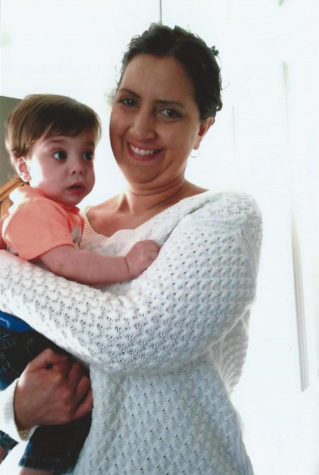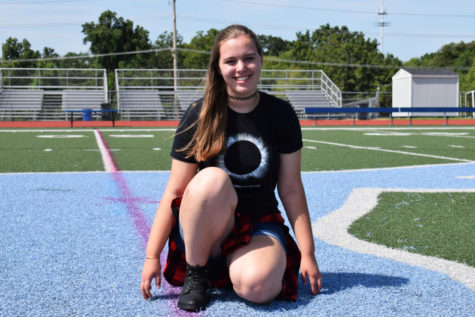From tending eggs to giving children a voice
Alumna Shireen Kinzy gives her life to children

Kinzy holds her nephew Grayson, who is about the age of kids who are in the First Steps program. He also shares the same birthday as Kinzy. “I like playing with my nephews and talking with them; I don’t treat it like work,” Kinzy said. “It’s just fun watching them learning how to talk and play.”
In modern high school child development classes, students often take care of robotic children for a day. Back when 1988 alumna Shireen Kinzy was in high school, students would take care of an egg.
“We had to keep an egg and take it wherever we went. If we went out, we were supposed to leave it with our parents to babysit. The whole goal was not to break your egg,” Kinzy said. “It was too hard to go through the school day walking through the halls and not have someone bump into you, so most people brought it home and kept it there until the due date.”
The egg only mimicked childcare, and it was not until college that Kinzy got real first-hand experience with children as part of a practicum with her social work major.
“I worked at a preschool for lower income children. We would do home visits with their families to make sure they had everything they needed as far as food, clothes and other basic needs,” Kinzy said.
Kinzy did not spend much time as a social worker, as her first job uncovered her true calling.
“After I graduated, I had a job at a treatment center for kids with autism and other speech delays. That’s where I got interested in speech pathology, seeing how the therapists worked with the children there,” Kinzy said. “I went back to school to get a Masters degree in communication disorders at Fontbonne [University].”
Although she had already gained experience as a social worker, Kinzy welcomed the change.
“I learned a lot about different home lives and it makes you very grateful. You can’t help but compare your childhood with these children growing up,” Kinzy said. “If I was an actual social worker, I would not be cut out for that because it was too sad.”
Kinzy now works with First Steps, a Missouri program to intervene with speech impediments before children reach the age for preschool. They help children with autism, down syndrome and rare genetic disorders as well as children too young for a diagnosis at all.
“The hardest part is working with a lot of kids with temper tantrums. It’s my job to teach parents how to deal with these temper tantrums, and the parents sometimes feel that they cannot do this, but it is something they can do. I feel like I’m the only one going in once a week to help the children since the parents aren’t able to do it during the week,” she said.
One of the common misconceptions about Kinzy’s job is that she jumps straight into teaching children words and phrases.
“There are a lot of things that have to happen before teaching someone how to talk. You have to teach a child to pay attention, how to play, how to focus on a person. Those are all pre-speech skills that people don’t realize have to go in before someone can talk,” she said.
Despite the challenges, several of the families Kinzy works with have seen drastic improvements, even sometimes having children on par with their age group.
“If I have a kid who is not talking, when they exit the program when they are three and are talking in sentences, that is a good feeling,” Kinzy said. “Ultimately, I would just like for my children to communicate better with their family and friends.”


Evelyn Tarpy • Sep 19, 2017 at 3:50 pm
I am so proud of my daughter-in-law, SHIREEN KHUHRO KINZY (1988 graduate) for the very important work she does in helping young children with early speech development. I am equally proud of my granddaughter, SYDNEY KINZY, for her well-written article about her mom’s career!
Shafiq khuhro • Sep 19, 2017 at 3:48 pm
Your mom is doing a wonderful job for the humanity, we are extremely proud of her.
Evelyn Tarpy • Sep 19, 2017 at 3:38 pm
I am so proud of my daughter-in-law, Shireen Kinzy, and her very important work with young children who need help in language development. I am equally proud of my granddaughter, Sydney Kinzy, who wrote the article about her mom’s career!